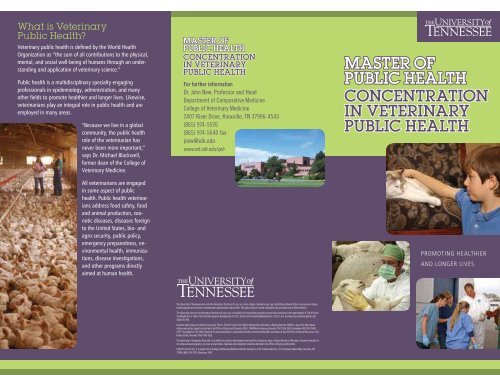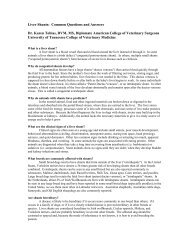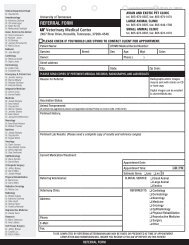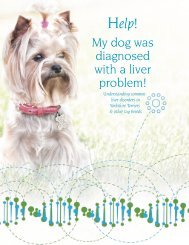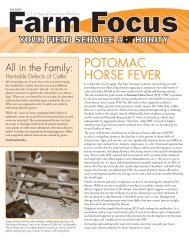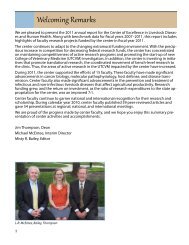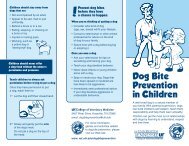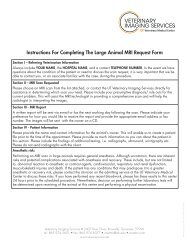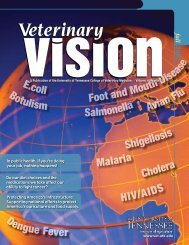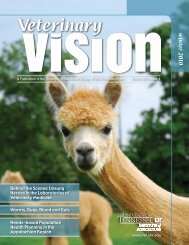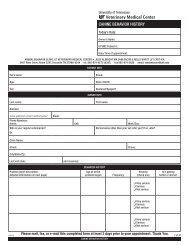download the brochure - The University of Tennessee College of ...
download the brochure - The University of Tennessee College of ...
download the brochure - The University of Tennessee College of ...
Create successful ePaper yourself
Turn your PDF publications into a flip-book with our unique Google optimized e-Paper software.
Veterinary public health is defined by <strong>the</strong> World Health<br />
Organization as “<strong>the</strong> sum <strong>of</strong> all contributions to <strong>the</strong> physical,<br />
mental, and social well-being <strong>of</strong> humans through an understanding<br />
and application <strong>of</strong> veterinary science.”<br />
Public health is a multidisciplinary specialty engaging<br />
pr<strong>of</strong>essionals in epidemiology, administration, and many<br />
o<strong>the</strong>r fields to promote healthier and longer lives. Likewise,<br />
veterinarians play an integral role in public health and are<br />
employed in many areas.<br />
“Because we live in a global<br />
community, <strong>the</strong> public health<br />
role <strong>of</strong> <strong>the</strong> veterinarian has<br />
never been more important,”<br />
says Dr. Michael Blackwell,<br />
former dean <strong>of</strong> <strong>the</strong> <strong>College</strong> <strong>of</strong><br />
Veterinary Medicine.<br />
For fur<strong>the</strong>r information<br />
Dr. John New, Pr<strong>of</strong>essor and Head<br />
Department <strong>of</strong> Comparative Medicine<br />
<strong>College</strong> <strong>of</strong> Veterinary Medicine<br />
2407 River Drive, Knoxville, TN 37996-4543<br />
(865) 974-5576<br />
(865) 974-5640 fax<br />
jnew@utk.edu<br />
www.vet.utk.edu/vph<br />
All veterinarians are engaged<br />
in some aspect <strong>of</strong> public<br />
health. Public health veterinarians<br />
address food safety, food<br />
and animal production, zoonotic<br />
diseases, diseases foreign<br />
to <strong>the</strong> United States, bio- and<br />
agro-security, public policy,<br />
emergency preparedness, environmental<br />
health, immunizations,<br />
disease investigations,<br />
and o<strong>the</strong>r programs directly<br />
aimed at human health.<br />
PROMOTING HEALTHIER<br />
AND LONGER LIVES<br />
<strong>The</strong> <strong>University</strong> <strong>of</strong> <strong>Tennessee</strong> does not discriminate on <strong>the</strong> basis <strong>of</strong> race, sex, color, religion, national origin, age, disability or veteran status in provision <strong>of</strong> educational<br />
programs and services or employment opportunities and benefits. This policy extends to both employment by and admission to <strong>the</strong> <strong>University</strong>.<br />
<strong>The</strong> <strong>University</strong> does not discriminate on <strong>the</strong> basis <strong>of</strong> race, sex, or disability in its education programs and activities pursuant to <strong>the</strong> requirements <strong>of</strong> Title VI <strong>of</strong> <strong>the</strong><br />
Civil Rights Act <strong>of</strong> 1964, Title IX <strong>of</strong> <strong>the</strong> Education Amendments <strong>of</strong> 1972, Section 504 <strong>of</strong> <strong>the</strong> Rehabilitation Act <strong>of</strong> 1973, and <strong>the</strong> Americans with Disabilities Act<br />
(ADA) <strong>of</strong> 1990.<br />
Inquiries and charges <strong>of</strong> violation concerning Title VI, Title IX, Section 504, ADA or <strong>the</strong> Age Discrimination in Employment Act (ADEA) or any <strong>of</strong> <strong>the</strong> o<strong>the</strong>r above<br />
referenced policies should be directed to <strong>the</strong> Office <strong>of</strong> Equity and Diversity (OED), 1840 Melrose Avenue, Knoxville, TN 37996-3560, telephone (865) 974-2498<br />
(V/TTY available) or 974-2440. Requests for accommodation <strong>of</strong> a disability should be directed to <strong>the</strong> ADA Coordinator at <strong>the</strong> UTK Office <strong>of</strong> Human Resources, 600<br />
Henley Street, Knoxville, TN 37996-4125.<br />
<strong>The</strong> <strong>University</strong> <strong>of</strong> <strong>Tennessee</strong>, Knoxville, in its efforts to ensure a welcoming environment for all persons, does not discriminate on <strong>the</strong> basis <strong>of</strong> sexual orientation in<br />
its campus-based programs, services, and activities. Inquiries and complaints should be directed to <strong>the</strong> Office <strong>of</strong> Equity and Diversity.<br />
E181730-00-001-09 project <strong>of</strong> <strong>the</strong> <strong>College</strong> <strong>of</strong> Veterinary Medicine with <strong>the</strong> assistance <strong>of</strong> UT Creative Services; 107 Communications Bldg.; Knoxville, TN<br />
37996; (865) 974-2225. Revisions: 7467.
<strong>The</strong> UT Master <strong>of</strong> Public Health Program<br />
Mission Statement: <strong>The</strong> graduate public health program<br />
at <strong>the</strong> <strong>University</strong> <strong>of</strong> <strong>Tennessee</strong> provides quality education<br />
and leadership to promote health in human populations<br />
through interdisciplinary instruction, research<br />
and community service.<br />
<strong>The</strong> UT MPH program is <strong>the</strong> first nationally accredited<br />
program outside a school <strong>of</strong> public health and has<br />
maintained full accreditation since 1969. Students may<br />
focus on one <strong>of</strong> three concentrations: community health<br />
education; health planning and administration; or<br />
veterinary public health. <strong>The</strong> curriculum consists <strong>of</strong> 42<br />
semester hours:<br />
Core Courses (17 semester hours)<br />
Environmental and Occupational Health<br />
Public Health Policy and Administration<br />
Biostatistics<br />
Principles <strong>of</strong> Epidemiology<br />
Health and Society<br />
Graduate Seminar in Public Health<br />
Concentration and Electives<br />
(19 semester hours)<br />
Field Practice/Internship or<br />
Master’s Essay<br />
(6 semester hours)<br />
Students enrolled full-time can finish <strong>the</strong><br />
degree in one and a half to two years.<br />
Veterinary students may complete much<br />
<strong>of</strong> <strong>the</strong> course work in parallel with <strong>the</strong>ir<br />
veterinary curriculum but may need<br />
additional time for field practice and/or<br />
fur<strong>the</strong>r course work after receiving <strong>the</strong><br />
DVM degree.<br />
Veterinary Public Health<br />
Concentration<br />
In an effort to serve <strong>the</strong> growing<br />
demand for veterinarians<br />
skilled in public health, <strong>the</strong> UT<br />
<strong>College</strong> <strong>of</strong> Veterinary Medicine<br />
has partnered with <strong>the</strong> <strong>College</strong><br />
<strong>of</strong> Education, Health, and Human Sciences to <strong>of</strong>fer <strong>the</strong><br />
Master <strong>of</strong> Public Health degree with concentration in<br />
veterinary public health.<br />
<strong>The</strong> VPH concentration is open to graduate veterinarians<br />
and students enrolled in <strong>the</strong> <strong>College</strong> <strong>of</strong> Veterinary<br />
Medicine. Most public health courses are <strong>of</strong>fered<br />
in <strong>the</strong> evenings and summers to allow veterinary<br />
students <strong>the</strong> opportunity to complete much <strong>of</strong> <strong>the</strong><br />
graduate program in parallel with <strong>the</strong>ir veterinary<br />
education.<br />
<strong>The</strong> Master <strong>of</strong> Public Health<br />
degree will prepare veterinarians<br />
to sit for <strong>the</strong> certifying<br />
examination <strong>of</strong> <strong>the</strong> American<br />
<strong>College</strong> <strong>of</strong> Veterinary Preventive<br />
Medicine, once <strong>the</strong> qualifying<br />
criteria are met.<br />
Where Are Public Health<br />
Veterinarians Employed?<br />
Government<br />
State and Local Health Departments<br />
Centers for Disease Control and Prevention<br />
Food and Drug Administration<br />
United States Department <strong>of</strong> Agriculture<br />
National Institutes <strong>of</strong> Health<br />
Environmental Protection Agency<br />
Uniformed Services<br />
Academic Institutions<br />
Non-pr<strong>of</strong>it Organizations<br />
International Organizations<br />
World Health Organization<br />
Pan American Health Organization<br />
How to Apply<br />
Graduate veterinarians apply directly to <strong>the</strong> Graduate<br />
School and <strong>the</strong> MPH program. Veterinary students at<br />
UT may apply to <strong>the</strong> MPH program or enroll in core<br />
public health courses during <strong>the</strong>ir first year. Students<br />
must be accepted in <strong>the</strong> MPH program to take more<br />
than 10 hours <strong>of</strong> public health courses. Enrollment in<br />
some courses may be limited to students admitted to<br />
<strong>the</strong> public health program.<br />
For Application Materials<br />
<strong>The</strong> UT Graduate School:<br />
http://gradstudies.utk.edu/apppro.shtml<br />
<strong>The</strong> UT Public Health Program:<br />
http://hes.utk.edu/grad/public_health.html<br />
MPH Application Deadlines<br />
October 1 for spring semester<br />
February 1 for summer semester<br />
April 1 for fall semester


